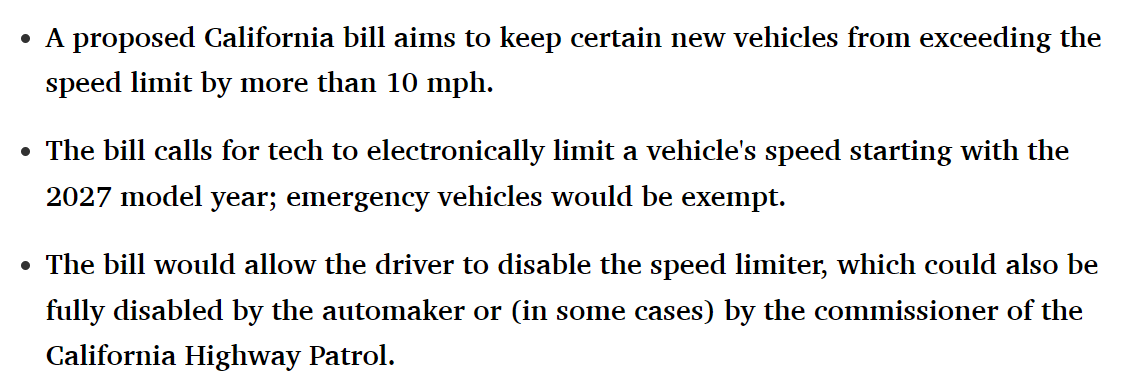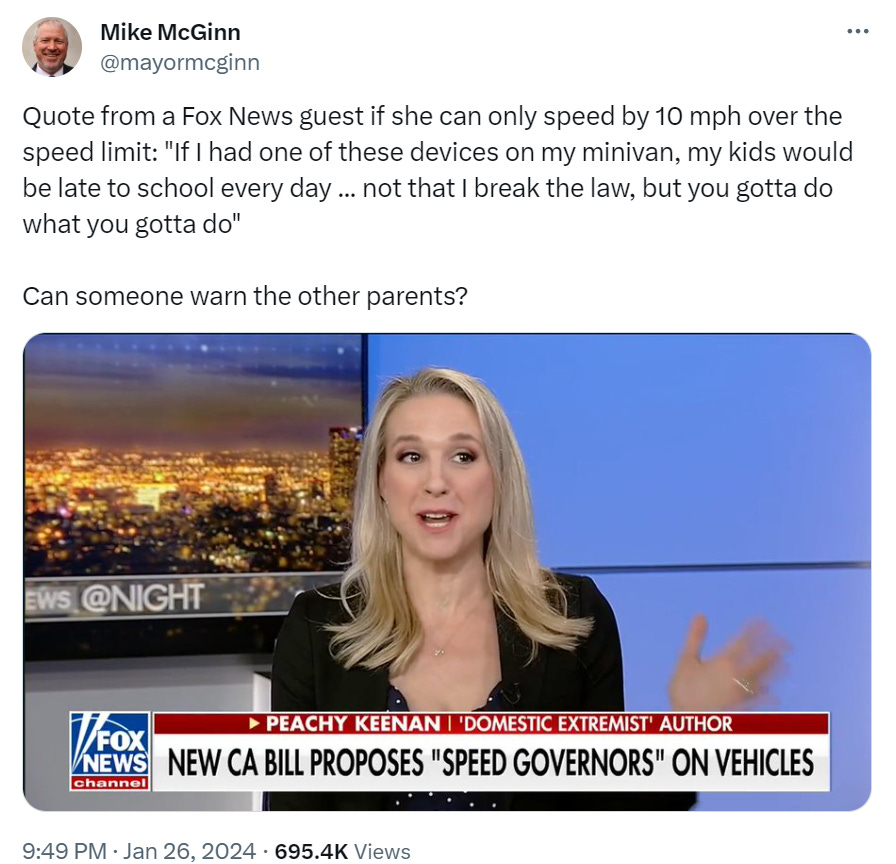Watch Your Speed, Guv'nor
Is freedom the freedom to get away with little things? Or is speeding not a little thing?
A bill was recently introduced in the California state legislature that would do the following, according to Car and Driver:
I’ll come right out and say I would like this, a lot, and it should be federal regulatory policy. There are a few reasons why I favor it:
It should be possible to drive without accidentally exceeding the limit and falling victim to a speed trap. This would make driving much more relaxing—it’s mentally exhausting to keep your foot balanced on the pedal just so, in some cases for hours
It should be possible to drive the speed limit, or go 5mph over, without being aggressively tailgated, closely passed, honked, flashed, etc. When speeding is easy, people do it, and when people do it, it becomes difficult or even dangerous not to do it
Other vehicles—e-scooters and e-bikes—already have speed limiters, so there is no principle that a vehicle lacking a speed limiter is a right
I also very much favor the speed limiting having an off switch—a privilege e-scooters and e-bikes do not enjoy—so that in those rare cases of genuine emergencies, you can get where you absolutely have to go. I’ve seen, on Twitter, some of the folks who favor speed limiters making fun of people who are afraid of them—oh, you scaredy-cat suburbanites think you need to outrun something all the time.
The fact is, maybe because I’m a motorist more than a pedestrian, the prospect of getting hit by a car is an abstract fear to me, whereas the fear of being stuck in a car that I need to get somewhere and the car not letting me is terrifying at a gut level. Making the limiter optional but requiring it to be turned on in normal circumstances makes a lot of sense to me. I’m just not very sympathetic to the idea that “freedom” or “personal responsibility” have anything to do with this—because 40,000 road deaths a year suggests that we are not responsible.
I say that because a lot of, if not most, of the pushback against this has a libertarian-ish flavor. Many people seem to feel that the speed limit and other traffic laws are not really laws; they’re just suggestions or norms that you can break with discretion. At most they’re victimless crimes. Legally, of course, there is no such thing. And speeding is not like wearing a seatbelt, where the only person you’re putting at risk is yourself. Some libertarians seem to me like daredevils, but fine, that’s you. One of the core principles of genuine libertarianism is to do no harm to others.
So I’m trying to figure out if there’s any actual principle here. What, exactly, are the opponents saying that is substantially different from I have a right to put other people’s lives at risk? That my freedom is worth more than other people’s lives? Do we really live in a country where the vast majority of people feel that way? I would like to think not.
I think for a lot of people “freedom” entails a certain amount of technically illegal or gray-area behavior that is judged to be sensible or prudent on a case-by-case basis. Freedom is about judgment. A lot of people would find no real difference between the perfect enforcement of the laws on our books right now, and actual authoritarianism. I’m conflicted over this, honestly. But I draw the line at putting other people in harm. I don’t think most people think they have a right to endanger others by speeding as much as they basically think speeding is a victimless crime. Most of the time, it is. But when it isn’t, the cost is very high.
And then there’s this:
This is, in a word, obscene. It betrays the idea that the thriving of children and the family is zero sum: that for my kids to get to school on time, other kids must be endangered. I’m not judging the woman—who has probably, like most of us, never really considered the other road users—but the idea. This is the thing about driving as the default mode of transportation. It requires us to assent to what I increasingly think might be an objectively antisocial, misanthropic way of perceiving the world and other people.
On the other hand, as I hinted above, I mostly drive to get around, and so the concerns and fears and frustrations that drivers feel are more real to me than those felt by cyclists or pedestrians. So in all likelihood I would find it frustrating not to be able to speed on an empty Interstate, just like I find it frustrating to circle a parking lot once or twice before finding a spot.
But I’ve come to realize that to some extent that frustration is a choice, downstream of an unrealistic expectation of convenience. And those visible conveniences in turn impose invisible but real costs: the businesses that never open because they can’t meet a minimum-parking requirement. The people outside of cars whose safety is subordinated to the convenience of motorists. Once I realized these were real things and not just the whining of people who didn’t like cars ideologically, it changed my view of all of this.
I would hope people who think speeding is something like a constitutional right have not thought it all through before coming to their conclusion, because if they have, I really don’t know what to tell them.
Related Reading:
What If I Should Drive An SUV?
Thoughts On Turnstiles and Glass Houses
Thank you for reading! Please consider upgrading to a paid subscription to help support this newsletter. You’ll get a weekly subscribers-only piece, plus full access to the archive: over 900 pieces and growing. And you’ll help ensure more like this!






Not that I break the law.. but i break the law? So weird.
Let me state up front that I’m a hypocrite.
I agree with your assessment even though I’m someone who routinely exceeds posted speed limits.
I confess that I’m not a fan of speed bumps, single lane city streets, red light or speed cameras.
Unfortunately, it’s the price we drivers will have to pay to reduce the carnage on our streets and roads.